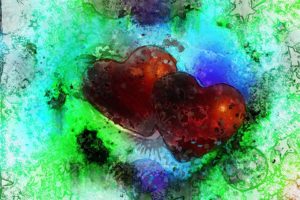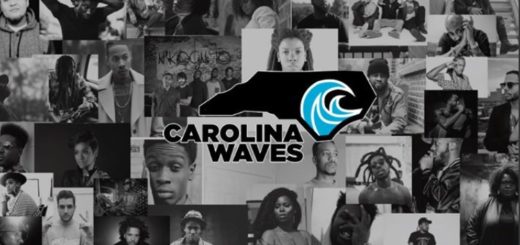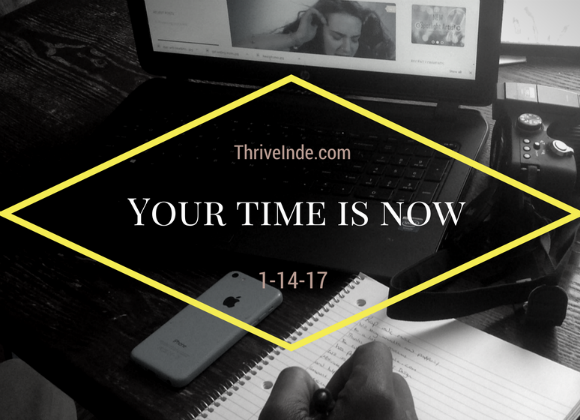Heart art: An artists interpretation of what it is to create and write music

Music is powerful. It is the melodic therapy of calculative instruments and appropriate words that give music its potent powers.
As a child, my mother and others would get so vexed with me because of my brooding silence. In frustration, they would exclaim “well, I can’t do anything if you don’t tell me how you feel!”
As a child, I would open my mouth to reply, but alas, my mind would flat line, no epiphany would spill, no understanding would form, no comfort would materialize. There was only silence.
It wasn’t that I didn’t want to speak. I wanted to tell listening ears how I was feeling so bad that my mind would typhoon sending my heart and lungs into a frenzy. But the only thing during that time that ever escaped these lips was a joke, a stutter, or an angry word.
Beyond anything, I wanted desperately to understand and decipher my emotions but I didn’t know how I felt. I didn’t even know I could feel.
But the oddest thing would happen whenever a song would play. It didn’t matter what genre. When a song played my senses would shut down and my mind would come to life with a corresponding memory. I would move, I would bend, I would become the rhythm and the artist.
My imagination would go haywire. For a hook and a few verses, Jaleel Naim Hunt had a heartbeat.
I didn’t know what to make of this, but I knew it was touching my heart. I felt understood like the music was a vital organ in my body. The 3 minutes those songs would play were an eternity, in which I and music had a conversation that lasted a lifetime.
But inevitably the song would end, my heart would cement, and Jaleel Naim Hunt would once again become mute.
Several key events and a peculiar time later, I found myself sitting in the dark at 4 in the morning on my bedroom floor. As I sat there the most unbelievable thing happened.
Every single color of the color spectrum was creating fireworks in my mind. Colors I can’t describe and colors I’ve never seen since. Shapes were blooming and withering in my mind like galactic flowers, and I remember several lines of innumerable lengths moving in and out my field of vision extremely quick.
You probably think this was the result of sleep deprivation as I had been up for 72 hours straight. But there I was sitting on my bedroom floor with no weariness, no fatigue, and no tiredness. I was wired.
I attribute the cause of this to what I was going through in my life at that time, which if several people ask about I’ll delve into.
Nonetheless, I found myself sleep deprived for 72 hours all because a close friend of mine suggested that I try writing a song.
Let me explain something.
I’ve never thought about being an artist, I’ve never wanted to be an artist, and I definitely didn’t think it was possible for me to be an artist. Therefore when I put pen to paper, becoming a music artist was nowhere near my mind. In fact, as the pen glided across the paper my mind was completely blank.
As I came to, I Iooked down to see what I had written. I was shocked.
For the first time in my life, I looked into the cleanest mirror I’d ever seen.
I saw a reflection of myself. A memory and feeling that had come from my heart.
I pushed pause on the instrumental that had been playing on repeat, rewound it, and spoke the line aloud as the music played.
Strangely I felt relief, peace, and sweet tranquility. Kind of like when you place your foot into a fly pair of shoes that’s just your size.
I had always felt that I couldn’t feel. But what it was, was that I was uncomfortable with sharing my true sentiments. What if they made me feel vulnerable? What if no one listened?
All I know is that when I spoke that memory to the music everything fit picture perfect and I felt relief, peace, and sweet tranquility.
So this brings me to the eye of the storm, the reason I write this article. I want to explain how to wield the power of music. This is simply the tip of the iceberg because in order to truly do this subject justice I would need a lotta space on somebodies website.
But in order to explain how to wield the power of music, I must first deal with the elephant in the room.
There is a huge misunderstanding of what constitutes real music. What some people call real music is in reality just manufactured trash. Please, give me some room to elaborate.
Noise can make you move, but those erratic movements aren’t the electric slide. In order for it to be the electric slide, you gotta boogie-woogie Woogie!
So you think you can dance? That can only be verified if you step on the color coordinated highlighted tile with a venomous rhythm!
What I’m saying is, music can either build you up or tear you down. It can heal you or kill you. Music can be your best friend or worst enemy. It can comfort you or make you mourn.
Music is what I’d like to call Heart Art.
Real music doesn’t only come directly from your heart but it has criteria. It is not the glorification of an experience. Heart Art is the correct analysis of a thing, evident by the tone and delivery of the artist with due consideration for the subject they are presenting.
Please, give me some room to elaborate.
If a song was about a wedding, and at the altar, the groom revealed an act of infidelity, if we were just considering that moment, it could be a sad song.
Then why are their songs in every genre that glorify acts of infidelity? Because there is Heart Art and there is manufactured trash.
This article is not written for the manufacturer of trash who abuses the power of song. These people never once consider the millions they are stopping into degradation all for the sake of fleeting dollars and vain arrogance. They ruin the minds of millions of men women and children all for an award or flattering word that in time becomes rusted metal and the reason many go insane. No, this article is not written for the manufacturer of trash. In humility, I can never elevate myself above a man or a woman, but responsibility teaches me not to endorse certain men and women.
This article is written for the man or woman, boy or girl, who wishes to soothe the turmoil of their soul and through their therapy create relief and comfort for somebody else. Please, let me elaborate.
I’ll never forget attempting my first song. It painfully involved countless hours of writing, pages full of words and nothing that remotely resembled a lyric. I didn’t know what else to do. I had listened to the instrumental at least 50 times begging gold to appear on the paper. Yet nothing appeared. A whole bunch of nothing.
I wasn’t going to give up easily, especially given my history with being mute. I pushed desperately forward and came to a breakthrough.
At this point, I want to introduce you to two concepts, pay attention because they are indispensable to your skill as a songwriter. You will spend your entire career refining and mastering these 2 basic building blocks. They are called insight and inspiration.
If you use your own point of view coupled with these 2 things you will create originality. Every songwriter should strive for originality. This is how musicians become iconic.
Insight

I’m going to keep it simple, insight is x-ray vision and inspiration is the feeling you get when you walk into a dark room and turn the lights on. I’m going to show you where to find both of these so that you always have unlimited ammo to write your music.
When I failed at writing my first song, I became discouraged. I became discouraged because I realized achieving this would not be easy. But I realized I could make it easier on myself if I used my x-ray vision to peep into the next artist’s’ process. Maybe if I delineated their process step by step I would find insight into the instruction that I needed to accomplish my task.
And so my education ensued. For a minimum of 2 hours a day (this is an extremely conservative estimate, I literally ate and breathed this) I gathered as much information as possible. I peeped the songwriting process of an artist in every genre. From artist I never heard of even to the ones I couldn’t identify with. I wanted to know everything. Why did they write music? What led them to write music? What motivated them to write music? When did they write music? Where did they write music? And the question I wanted an answer to more than anything was, how did they write music?
I applied this formula to jazz, hip-hop, metal, blues, rock, country, RnB, folk, and bluegrass. I listened to music and artist from every era, from the 1940’s to the current era. I found the answer to my questions in books, magazines, podcasts, radio interviews, and in the minds of any music lover that would give me a nugget of insight.
Through this process my doubts dissipated, my confidence increased, and I became aware of my possibility of having a shot at becoming a music artist.
I utilized insight at this stage of the process to see beyond the surface. When it comes to writing music, it’s not enough to be able to read a clock and affirm the time. You need to be able to look at that clock and explain the cogs and the gadgets that are whirring in the machine that are causing the little hand and the big hand to rest on the 12 o’clock position.
If you can come to understand and articulate the who, what, when, where, why, and how of other artists, you will understand music. It is our lack of understanding music as aspiring songwriters that produce the obstacle between us and our goals.
Now let me share with you how to obtain endless inspiration.
Inspiration

You have to overload on reading lyrics. Most artists have the entire body of work displayed in one area. Read through the albums like chapters in a book. When I read through various artists, I noticed that lyrics were really similar to poetry. That was a comforting realization that boosted my self-confidence because I had literally written hundreds of poems before writing my first song.
The difference, I noticed, was in the structure. And it was at this moment that a light was cut on in a dark room.
The songs were broken down into verses, choruses, hooks, intros, verses, outros, bridges, etc. At this point, I reasoned with myself that if I could learn to write each one of these, I could write a song. Moreover, that song I was attempting to write could be broken up and written over time.
Or, I could write a hook today, and write a verse tomorrow.
Always use patience when writing songs, never force it. For me, it typically takes about 10 days for me to write a complete song. Some songs take longer. Some require a shorter span of time, but on average it takes about 10 days.
Songs are all about how you organize the above-mentioned concepts. The simplest song structure contains only hooks and verses. More complex structures contain bridges, intros, outros, and pre-choruses to name a few. Still more advanced than that would be songs that halves verses to place hooks, or songs that repeat the same phrases over and over again, or songs that leave out the hooks to just focus on intros and outros and verses. Truthfully it’s all about how you choose to mix and match the concepts and what fits the instrumental your writing too.
Now that’s a whole other article. But again, I’d be happy to delve into that information if enough people ask for it.
Every genre chops and screws these concepts in a unique manner to create timeless music. Every artist within that genre uses these rules uniquely to commemorate their own styles.
Remember this formula.
Time…Discipline…Patience.
The only thing that separates songwriters artistically is skill. Skill can be obtained by anybody with persistent dedication.
But what you want is to become elite.
Only elite songwriters can make a living off of music as only elite athletes can survive in professional leagues.
In order to be elite, you have to write hundreds, thousands, and if possible millions of songs. There is no shortcut. You have to put in the time if you wanna rhyme. You have to write songs for years, 3 years, 5 years, 10 years. You have to write a song in every genre, for every emotion, and from every perspective.
Continuous education
In conclusion, I want to leave you with a rule worth its weight in gold. It’s called continuous education. Learn everything there is to know about music, then unlearn it. Most of what you learn about music is going to come from your experiences. Understand that songs are everywhere and happening every moment, therefore the skillful artist always has their pen ready and their mind sharp.
When you’ve mastered songwriting, then you must master the art of recording. When you’ve mastered the art of recording, then you must master the art of timing and presentation. Remember the golden rule: continuous education.
So enjoy the journey, set lofty goals, and write music that people can live to.







Recent Comments